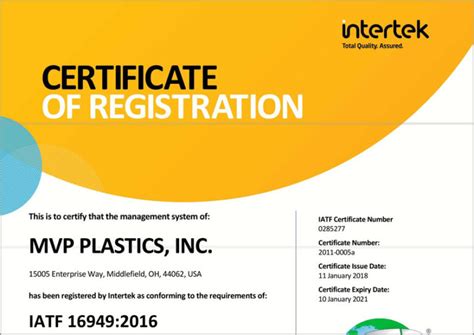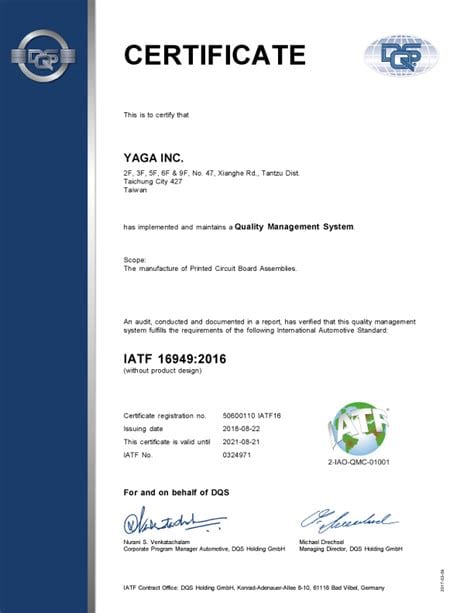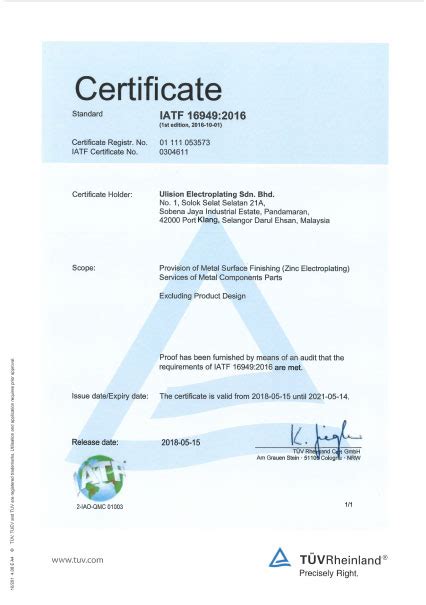What is IATF Certification?
The International Automotive Task Force (IATF) is an organization that develops and maintains the IATF 16949 standard, which is a quality management system (QMS) standard specifically designed for the automotive industry. IATF 16949 is based on the ISO 9001 standard but includes additional requirements that are specific to the automotive industry.
IATF certification is a process by which an organization demonstrates its compliance with the IATF 16949 standard. The certification is awarded by an accredited certification body after a successful audit of the organization’s QMS.
Benefits of IATF Certification
IATF certification provides several benefits to organizations in the automotive industry, including:
-
Improved quality: IATF 16949 focuses on continuous improvement and the prevention of defects, which can help organizations improve the quality of their products and services.
-
Increased customer satisfaction: By meeting the requirements of IATF 16949, organizations can demonstrate their commitment to quality and customer satisfaction, which can lead to increased customer loyalty and retention.
-
Reduced costs: IATF 16949 emphasizes the importance of process efficiency and waste reduction, which can help organizations reduce their operating costs and improve their bottom line.
-
Enhanced reputation: IATF certification is recognized globally as a mark of excellence in the automotive industry, which can help organizations enhance their reputation and competitiveness.
RAYPCB and IATF Certification
RAYPCB is a leading manufacturer of printed circuit boards (PCBs) for the automotive industry. The company has recently achieved IATF certification, demonstrating its commitment to quality and customer satisfaction.
The IATF Certification Process
The IATF certification process involves several steps, including:
-
Gap analysis: The organization conducts a gap analysis to identify areas where its QMS does not meet the requirements of IATF 16949.
-
Implementation: The organization implements the necessary changes to its QMS to meet the requirements of IATF 16949.
-
Internal audits: The organization conducts internal audits to ensure that its QMS is functioning effectively and efficiently.
-
Certification audit: An accredited certification body conducts an audit of the organization’s QMS to verify its compliance with IATF 16949.
-
Certification: If the organization passes the certification audit, it is awarded IATF certification.
RAYPCB’s IATF Certification Journey
RAYPCB’s journey towards IATF certification began in 2018 when the company decided to pursue certification to demonstrate its commitment to quality and customer satisfaction. The company conducted a gap analysis to identify areas where its QMS needed improvement and implemented the necessary changes.
In 2019, RAYPCB conducted internal audits to ensure that its QMS was functioning effectively and efficiently. The company also underwent a pre-assessment audit by an accredited certification body to identify any remaining areas for improvement.
In 2020, RAYPCB underwent a certification audit by an accredited certification body. The audit was conducted over several days and involved a thorough review of the company’s QMS, including its processes, procedures, and documentation.
After successfully passing the certification audit, RAYPCB was awarded IATF certification in September 2020. The certification is valid for three years, after which the company will need to undergo a recertification audit to maintain its certification.
The Impact of IATF Certification on RAYPCB
IATF certification has had a significant impact on RAYPCB’s operations and reputation in the automotive industry. Some of the key benefits of certification include:
-
Improved quality: IATF certification has helped RAYPCB improve the quality of its PCBs by focusing on continuous improvement and the prevention of defects.
-
Increased customer satisfaction: By meeting the requirements of IATF 16949, RAYPCB has demonstrated its commitment to quality and customer satisfaction, which has led to increased customer loyalty and retention.
-
Reduced costs: IATF certification has helped RAYPCB reduce its operating costs by emphasizing the importance of process efficiency and waste reduction.
-
Enhanced reputation: IATF certification has enhanced RAYPCB’s reputation in the automotive industry, positioning the company as a reliable and trustworthy supplier of high-quality PCBs.

The Future of IATF Certification in the Automotive Industry
The automotive industry is constantly evolving, and the requirements for quality and safety are becoming increasingly stringent. As a result, IATF certification is likely to become even more important in the future.
Emerging Trends in the Automotive Industry
Some of the emerging trends in the automotive industry that are likely to impact IATF certification include:
-
Electrification: The shift towards electric vehicles is likely to create new challenges for automotive suppliers, including PCB manufacturers like RAYPCB. IATF certification will be essential for ensuring the quality and safety of PCBs used in electric vehicles.
-
Autonomous driving: The development of autonomous driving technology is likely to create new requirements for PCBs, including increased reliability and durability. IATF certification will be essential for ensuring that PCBs meet these requirements.
-
Connectivity: The increasing connectivity of vehicles is likely to create new challenges for PCB manufacturers, including the need for high-speed data transmission and electromagnetic compatibility. IATF certification will be essential for ensuring that PCBs meet these requirements.
The Importance of Continuous Improvement
To remain competitive in the automotive industry, PCB manufacturers like RAYPCB will need to continuously improve their processes and products. IATF certification provides a framework for continuous improvement by requiring organizations to regularly assess their QMS and identify areas for improvement.
By embracing a culture of continuous improvement, PCB manufacturers can stay ahead of emerging trends and meet the evolving needs of their customers in the automotive industry.

Conclusion
IATF certification is a mark of excellence in the automotive industry, demonstrating an organization’s commitment to quality and customer satisfaction. RAYPCB’s achievement of IATF certification is a significant milestone for the company, positioning it as a reliable and trustworthy supplier of high-quality PCBs for the automotive industry.
As the automotive industry continues to evolve, IATF certification will become even more important for PCB manufacturers like RAYPCB. By embracing a culture of continuous improvement and staying ahead of emerging trends, PCB manufacturers can remain competitive and meet the evolving needs of their customers in the automotive industry.

Frequently Asked Questions (FAQ)
-
What is IATF certification?
IATF certification is a process by which an organization demonstrates its compliance with the IATF 16949 standard, which is a quality management system (QMS) standard specifically designed for the automotive industry. -
What are the benefits of IATF certification?
The benefits of IATF certification include improved quality, increased customer satisfaction, reduced costs, and enhanced reputation in the automotive industry. -
How long is IATF certification valid for?
IATF certification is valid for three years, after which the organization will need to undergo a recertification audit to maintain its certification. -
What are some of the emerging trends in the automotive industry that are likely to impact IATF certification?
Some of the emerging trends in the automotive industry that are likely to impact IATF certification include electrification, autonomous driving, and connectivity. -
How can PCB manufacturers remain competitive in the automotive industry?
To remain competitive in the automotive industry, PCB manufacturers can embrace a culture of continuous improvement, stay ahead of emerging trends, and meet the evolving needs of their customers by achieving and maintaining IATF certification.

No responses yet